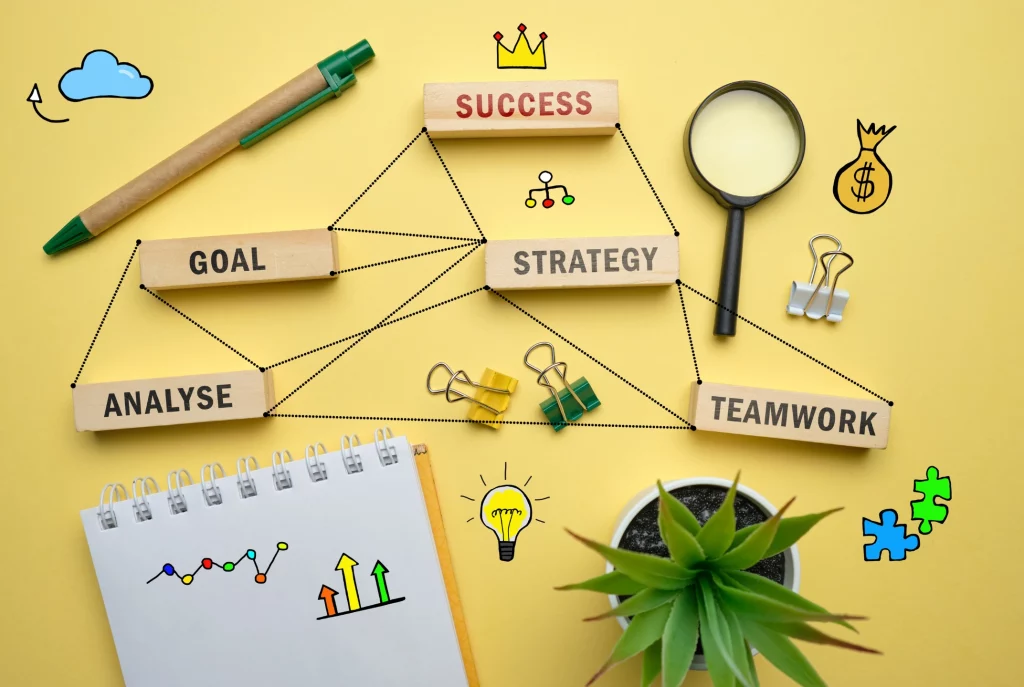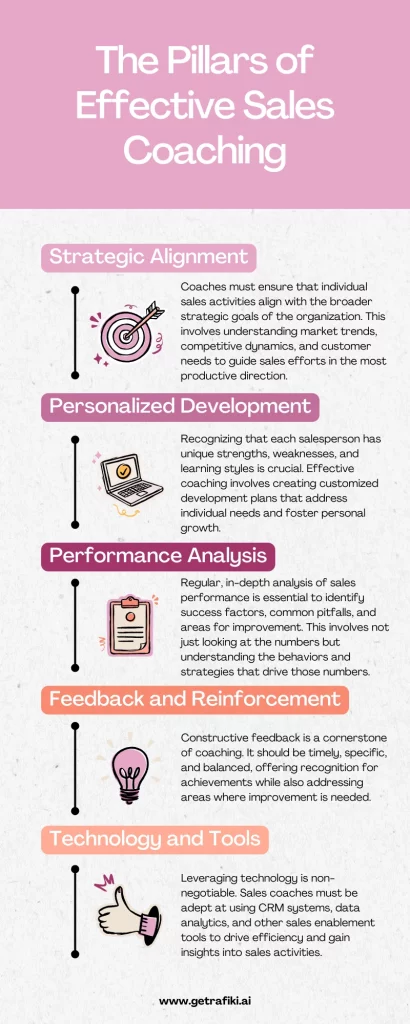Why Rafiki
Pricing


Pricing
Solutions

RevOps Leaders
Synchronize revenue generating functions

SDR Leaders
Get your team aligned and Coach your Reps 3x faster at scale

Sales Leaders
Unlock pipeline truth, drive confident forecasts

Just like a great coach shapes an athlete's career, effective sales coaching can propel your team to new heights. But let's be honest, coaching isn't always easy. Feeling overwhelmed? You're not alone. Just as a sports coach hones an athlete's skills, instills discipline, and inspires peak performance, a sales coach equips sales professionals with the tools, knowledge, and motivation needed to excel in the demanding sales environment. However, despite the critical importance of sales coaching, many sales leaders find it challenging to effectively mentor their teams. This in-depth exploration delves into the nuances of sales coaching, its evolution, and provides a comprehensive guide to implementing effective sales coaching practices that drive success.
Get ready to witness transformed performance and celebrate shared victories - it's game time! 🏈
Sales coaching transcends mere performance reviews or target-setting exercises. It is a continuous, personalized process aimed at developing sales representatives' skills, enhancing their performance, and achieving sales excellence. Unlike traditional training, which often focuses on generic skills and knowledge, coaching is tailored to the individual needs of each salesperson, addressing specific challenges and opportunities they face in their sales journey.
The evolution of sales coaching reflects a shift from a purely numbers-driven approach to a more nuanced understanding of sales effectiveness. In the past, sales coaching might have focused primarily on increasing call volumes or meeting quotas. Today, it encompasses a broader spectrum of activities, including strategic planning, customer engagement techniques, and leveraging advanced sales technologies to improve productivity and effectiveness.
Effective sales coaching is built on several foundational pillars, each contributing to the overall success of the sales team.
There are different approaches to defining the "pillars" of sales coaching, so the specific number may vary depending on the source.
However, here's a comprehensive breakdown of 5 key pillars often emphasized for effective sales coaching:

1. Data-Driven Insights:
2. Focused Skill Development:
3. Collaborative Goal Setting & Tracking:
4. Actionable Feedback & Coaching:
5. Continuous Learning & Development:
Remember, these pillars are interconnected and work best when implemented holistically and effective coaching is an ongoing process, not a one-time event.
By focusing on these core principles, you can create a comprehensive and effective sales coaching program that empowers your team to achieve peak performance.
Forrester's guide on effective sales coaching programs underscores the importance of a culture of appreciation, consistent feedback, and coaching provided by managers to boost seller productivity. Despite the recognized benefits, less than half of the sellers surveyed reported receiving regular feedback or coaching, pointing to a significant opportunity for sales organizations to enhance their coaching frameworks
To transform sales coaching from a theoretical concept to a practical, impactful reality, sales leaders can follow a structured approach:
A coaching culture encourages continuous improvement, open communication, and mutual support among all team members.
This involves:
Effective coaching starts with a thorough understanding of each salesperson's current capabilities, performance levels, and potential areas for growth. This can be achieved through:
According to Forrester, a significant correlation exists between effective sales coaching and sales outcomes, with sixty-five percent of high-performing sales organizations reporting that their sales managers dedicate 20% or more of their time to coaching activities. These organizations often see a majority of their sales reps meeting or surpassing their quotas, underscoring the impact of coaching on scalable and repeatable revenue generation
Based on the identified needs, develop individualized coaching plans that outline specific goals, strategies, and timelines for improvement. These plans should:
Incorporate the use of sales technologies and data analytics to enhance coaching efforts. This can include:
By analyzing sales call data, Rafiki can help identify effective sales behaviors, pinpoint areas for improvement, and offer personalized coaching suggestions that lead to a more focused and efficient coaching process, allowing sales teams to adapt their strategies based on actual performance data and ultimately drive better sales outcomes.
Coaching is an ongoing process, not a one-time event. Regular check-ins, feedback sessions, and support are crucial for maintaining momentum and ensuring continuous improvement. This involves:
Rafiki's Coaching Dashboard helps managers keep track of their coaching activity by providing a clear view the calls they have attended, listened to, given feedback, added scorecards etc.
Encourage sales team members to learn from each other through structured peer coaching programs, collaborative learning sessions, and sharing best practices. This can help build a supportive team environment and accelerate collective improvement.
Regularly review the progress of coaching initiatives against the set goals and objectives.

Be prepared to make adjustments to coaching plans based on feedback, changes in the sales environment, or shifts in strategic priorities. 🥇
Empower salespeople to take ownership of their development by fostering a habit of self-reflection. Encourage them to regularly assess their own performance identify areas for improvement, and set personal goals. 🙌,
Tools like reflective journals, self-assessment checklists, and goal-setting frameworks can facilitate this process.
Tools like Rafiki, make it very easy to get Meeting Level Analytics that each rep can review and understand his/her performance without getting lost in org level data.
Link coaching efforts to the broader career aspirations and development plans of the sales team members. 🏆
Help them understand how improving specific skills and achieving sales targets can advance their career paths within the organization. This alignment can significantly increase their motivation and engagement.
Simulated sales scenarios, role-playing exercises, and mock sales calls can provide valuable hands-on experience in a controlled, risk-free environment. ☎️
These activities allow salespeople to practice their skills, experiment with different approaches, and receive constructive feedback in real-time.
Don't limit coaching to internal resources. Bring in external sales trainers, industry experts, and motivational speakers to provide fresh perspectives, share new techniques, and inspire the team. 🎖️
Participating in external sales workshops, webinars, and conferences can also expose the team to the latest trends and best practices in the field.
Create an environment of continuous learning by offering access to online courses, sales literature, and educational resources that salespeople can explore at their own pace. Encourage them to stay current with industry developments, emerging technologies, and innovative sales methodologies. 💡
In addition to sales techniques and product knowledge, focus on developing the emotional intelligence and soft skills of your team. Skills like empathy, active listening, and effective communication can significantly enhance customer interactions and build stronger relationships.🤝
Rafiki provides insights on emotional cues, talk-to-listen ratios, and the effectiveness of communication strategies. This allows for targeted feedback and coaching on empathy, active listening, and other critical soft skills, enabling sales reps to adapt and enhance their interactions with customers on-the-fly, fostering stronger relationships and improving sales outcomes.
Sales can be a challenging profession with its fair share of rejections and setbacks. Coach your team on resilience strategies to help them maintain a positive mindset, learn from failures, and bounce back stronger. Techniques like stress management, mindfulness, and maintaining a work-life balance can be invaluable. 💪
While achieving sales targets is important, it's also crucial to recognize and celebrate the efforts and learning that lead to those results.🥂
This can include acknowledging the application of new skills, improvements in customer engagement, and innovative problem-solving approaches.
Promote a culture of collaboration where sales team members support each other, share leads, and work together on complex deals. This team-selling approach can enhance learning, foster a supportive environment, and ultimately lead to better sales outcomes. 📈
By incorporating these additional strategies into your sales coaching program, you can create a more holistic and effective approach that not only improves sales performance but also contributes to the personal and professional growth of your team members.
Forrester's guide on effective sales coaching programs underscores the importance of a culture of appreciation, consistent feedback, and coaching provided by managers to boost seller productivity. Despite the recognized benefits, less than half of the sellers surveyed reported receiving regular feedback or coaching, pointing to a significant opportunity for sales organizations to enhance their coaching frameworks.
In the high-stakes world of sales, effective coaching can be the catalyst for achieving exceptional performance and driving business success. By understanding the principles of sales coaching, embracing a personalized and strategic approach, and leveraging the right tools and technologies, sales leaders can unlock the full potential of their teams.
Coach your Reps to Excellence with
As with any skill, mastery of sales coaching takes time, dedication, and a commitment to continuous learning and improvement.
However, the rewards—a motivated, high-performing sales team, satisfied customers, and improved business outcomes—are well worth the investment.
Start your free trial today!